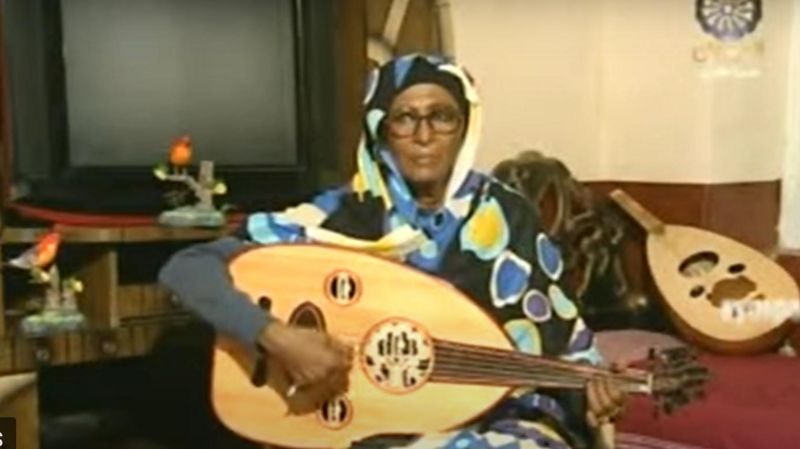
Coinciding with the war in Sudan, Google celebrates Sudanese composer
Under the title Asmaa Hamza: Sudanese Oud Player and Composer Celebrated by Google, BBC Arabic published the following article on Monday, July 17, 2023:
Google Search Engine is celebrating Asmaa Hamza, the Sudanese oud player and composer. On this day in 1997, Asmaa was among the winners of the major Laylat al-Qadr Music Competition in Sudan.
Her victory marked a turning point in her career, helping her gain recognition in a field dominated by men.
Who is Asmaa Hamza?
Asmaa Hamza Bashir was born in Halfaya Al-Muluk, Sudan, in 1936. She is an only child and has one daughter.
She developed a love for music at an early age and dreamed of becoming a singer. However, she had a vocal cord problem, but her ears were sensitive to melodies, and she expressed herself through whistling.
When her father heard her harmonious whistling, he bought her an oud instrument for practice.
Asmaa taught herself to play songs she heard on the oud from memory. Her father supported her from the beginning.
Womens creativity in the field of music was not socially accepted in Sudan. Therefore, her first musical composition was kept a secret.
Asmaas musical output increased as she grew older, and she composed melodies for many talented Arab artists. She became known as one of the first female composers in Sudan.
She continued to master playing the oud and became the first officially trained female oud player in 1946.
She started working in the Sudanese Music Corps in 1982.
Asmaa was nicknamed the Princess of the Oud and a devoted fan of Umm Kulthum due to the profound impact the legendary singer had on her when music was predominantly male-oriented.
Asmaa says in an interview about her love for Umm Kulthum, When my father noticed my interest, he took me to one of her concerts when we visited Cairo in 1963.
She was influenced by Egyptian artists such as Umm Kulthum, Mohammed Abdel Wahab, Abdel Halim Hafez, and Shadia. She learned from the renowned Sudanese musician and oud player Bashir Abbas.
Her Journey with the Oud and Composition
She started her journey with playing the oud in 1948, and her first composed song in 1956 was the poem Ya Ayyuni by Egyptian poet Ali Mahmoud Taha.
Asmaa Hamza describes that period by saying, I consider the oud as my friend who changed the course of my life when I wanted to become a doctor... and I loved singing and music, but because I had a defect in my vocal cords, I turned yellow.
One day in 1948, while she was whistling to entertain herself, her father heard her and called her, asking, Who is the boy with you? She replied, There is no one with me. He said, But I hear a boy whistling. She said, Thats me. He said, You whistle like boys? She replied, Because I cant sing.
This incident affected her father, and he bought her an oud. He told her, You must perform a song for us after 15 days, and after 15 days, she performed two songs for them. Thats how Asmaa continued in this field.
However, her first notable work as a composer was the song Al-Zaman Al-Tayyeb by Sudanese poet Sayyed El-Dusouqi, sung by Sudanese vocalist Samia Hassan in 1983.
She composed over 90 melodies, and she says in an interview that the operetta Azza wa Azza was the biggest work she composed.
She collaborated with artists such as Abdel Karim Kabli, Mohammed Mergani, Hisham Derbas, Samia Hassan, and Abida El Sheikh.
Sudanese composer Asmaa Hamza passed away on May 21, 2018, at her home in Halfaya, after a long battle with illness.


